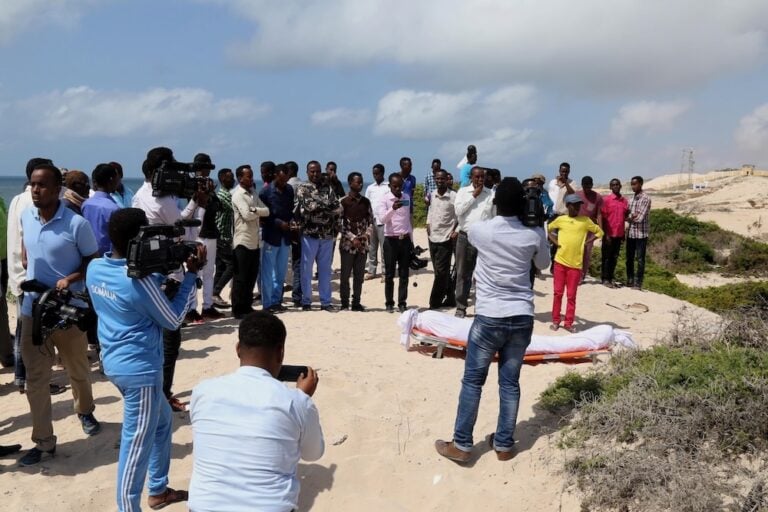Cameraman Ahmed Mohamed Shukur becomes the latest media fatality in Somalia after he is killed by landmine, while covering a counter-terrorist operation.
This statement was originally published on rsf.org on 4 October 2022.
The death of a young Somali TV reporter, who was killed by a landmine while covering a counter-terrorist operation by the security forces last week, has highlighted the need for more effective measures to protect journalists in Somalia, says Reporters Without Borders (RSF), calling for urgent action by the authorities.
A reporter for Somali National Television (SNTV), Ahmed Mohamed Shukur was the first Somali journalist to be killed in the course of their work this year. He was killed instantly on 30 September by a landmine explosion in Balcad, about 30 km northeast of the capital, Mogadishu, in Somalia’s Middle Shabelle region.
Aged 20, he was covering a counter-terrorism operation by the Somali armed forces aimed at dislodging Al-Shabaab militants from the area. An Islamist armed group affiliated to Al-Qaeda, Al-Shabaab has been responsible for many suicide-bombings and attacks on civilians and military in Somalia. A regional police commander was killed in the same incident.
“Ahmed Mohamed Shukur’s death is a shock,” said Sadibou Marong, the director of RSF’s Africa bureau. “In the course of his short professional life, this war reporter captured poignant images showing the reality of the armed conflict in his country. His death is a new wake-up call about the need for the authorities to create more effective measures to protect journalists. Press freedom must be protected so that people can continue to have access to quality reporting.”
RSF joins the National Union of Somali Journalists (NUSOJ), its partner in Somalia, in presenting its condolences to Shukur’s family, colleagues and friends.
A NUSOJ statement said: “He was a dedicated journalist, who often assumed great personal risk to factually report on what was going on in the Middle Shabelle region despite previous threats by Al-Shabaab because of his affiliation with government media.”
His death has underscored the need for the authorities to quickly implement the “National Action Plan” on journalists’ safety that was drafted and adopted at a three-day Consultative Forum on Safety and Security of Somali Journalists at the start of September in Mogadishu. Internal security minister Mohamed Ahmed Sheikh Ali told the forum that “your safety and security is of uttermost priority for us” and pledged to “improve relations between journalists and the security forces so that you operate in a conducive environment.”
No journalist had been killed in Somalia for more than 10 months. The most recent previous victim was Radio Mogadishu director Abdiaziz Mohamud Guled, who was killed in his car on 20 November 2021 in a targeted suicide bombing claimed by Al-Shabaab. SNTV director Sharmarke Mohamed Warsame, who was with Guled in the car, was badly injured by the blast. Somalia continues to be Africa’s deadliest country for journalists, with more than 50 killed in the past 12 years.
Somalia is ranked 140th out of 180 countries in RSF’s 2022 World Press Freedom Index.



